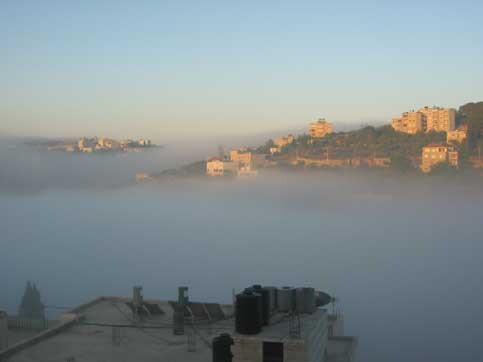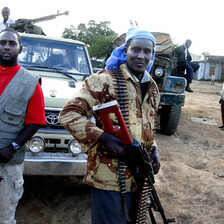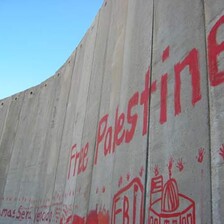
The hills of Birzeit at dawn. (Zachary Wales)
Recently, there was a rumble behind Gold’s Gym* in Birzeit - it really is called that - which was why Rami** was carrying spiked brass knuckles in his back pocket, and why, of course, he had to check them with a kid in a hardware shop before crossing Qalandia checkpoint with me.
“You don’t have to do this, habibi,” I told Rami, while eyeing the human cattle-chute that awaited us, and which the Israelis are now converting into an “international” border. Rami, who I know from Gold’s, had helped me pack that morning, then insisted on taking taxis with me to Ramallah then Qalandia. I almost had to fight him to pay my own way, and now I wanted to talk him out of making an unnecessary round trip through the most heavily armed checkpoint in the West Bank. “Really, there have been a lot of changes here over the summer,” I pleaded, “and your passbook may not be good anymore. When was the last time you were here?”
“Not so long ago. Five months, maybe?” he replied.
It was no use. But I didn’t want to protest that much. I was headed for a certain Shin Bet interrogation at Ben Gurion International Airport, followed by an agonizing layover in Heathrow, before I’d arrive in New York. Worse, I was leaving Palestine, a colonized nation that is not allowed to be a nation; a place of complexities, imperfections and wild imaginings. Rami’s stubborn camaraderie was symbolic of everything, a foreshadow of nostalgia. I wanted to hang onto to this, even if it would last only fifty more meters.
There is a tendency, if you live here long enough, to want to try something new each time you deal with checkpoint soldiers, particularly once you catch on to their level of intelligence. All generalizations are wrong, except the one that, when it comes to brains, checkpoint soldiers were shafted. According to an Israeli friend, receiving this assignment is tantamount to hearing, “For the love of Zion, don’t ever breed,” from your ranking officers. This may be why they are bullies, but also why polysyllabic tourism questions are all you need to force an armored personnel unit to abandon its post outside of Bethlehem. Then there is the Don’t Mind the Wookie approach, which I once employed at a checkpoint outside of Nablus:
Soldier: What is your name?
Me: It is written in my passport.
Soldier: What is your name?
Me: It is there in my passport, the one you are holding.
Soldier: What is your name?
Me: You can read, can’t you?
Soldier: What is your name?
Me: Chewbacca.
Soldier: Thank you. Move along.
There are also the imaginary scenarios in which you dive into a hail of bullets to save women and children; you’re immortalized before the UN, Amnesty International, and every media outlet with the words “social justice” in its mission statement; the U.S. realizes the horrors of its foreign policy; etc. Rami is pretty tough, so I was entertaining one such fantasy - wrestling guns from our oppressors and hijacking a hummer all the way to BGI - when I suddenly realized he had walked into the “women only” passageway. The masculinist Braveheart Revolt would have to wait.
One’s problems don’t up and disappear once you pass Qalandia, especially when it’s hot, and you want a decent price on a taxi to the airport. After bidding Rami farewell, I readjusted my mindset to haggling aggressively with the Arabic of a slow two-year-old. Fortunately for me, and for the reputation of the Arabic language, I chanced upon a kind, grandfatherly taxi driver - a Palestinian with Israeli “citizenship” - who gave in to, or perhaps pitied, my bartering capabilities.
“Inta btahki Arabi?” (“you speak Arabic?”) he asked smiling as I sat down in the passenger seat.
“Shway” (“Not for shit”), I replied, praying he wouldn’t ask me anything complicated.
In my experience, the transition from the West Bank to Israel has never been pleasant. It is the act of voluntarily leaving a society where nearly everyone is outgoing and hospitable, then entering one where most people are paranoid, judgmental and usually armed. I was therefore grateful to notice that my driver extended the former qualities, as he enthusiastically pointed to the Palestinian villages we passed along the fringe of the West Bank. “Shoof!” (“Look!”) Beit Hanina hone (“here”),”? he said, pointing to the West, “Ou (“and”) Beit Hanina hunak (“there”),” now pointing to the East. Still smiling, he motioned ahead naming villages we would pass along the way, “Biddu, Beit A’nan, Beit Leqia ou Bil’in”.
At one point in the drive, the path of the future Segregation Wall became visible. I pointed to it, “Al-jadar aunsuriyya” (“Apartheid Wall”). He gave it a contemplative look, then repeated using the same motions, but with less of a smile, “Biddu, Beit A’nan, Beit Leqia ou Bil’in…”
I hadn’t seen Bil’in since early July, when I joined a demonstration that ended in a mild skirmish between Israelis with guns and young Palestinian men with stones, at the top of a hill where the wall is supposed to be built. From there, I recalled, I had a clear view of the 575 acres (2,000 dunums) of Bil’in’s land that Israel will confiscate with the wall. I also remembered staring at the monstrous, uniform condominiums of Hashmonaim Mattityahu, Lapid and other Israeli colonies that have illegally sprung up over the past 15 years, under the smokescreen of Oslo. Now we were passing Bil’in on the other side, where the settlements felt larger than life, while Bil’in, for all of its audacity, would appear miniscule and distant: An afterthought in the grander scheme of foreigners.
We were approaching another checkpoint, which reminded me of something I said I would do before leaving: erase the memory on my cell phone. Realistically, this makes as much sense as throwing salt over your shoulder, or avoiding cracks in the sidewalk. But I had no idea what was in store at Ben Gurion. Maybe my name was on The List. Maybe there was no List. Maybe They could care less about me and the minimal effect my activism has had. But stranger things have happened; non-activist individuals who visited the West Bank have been pulled aside and intimidated for no explicable reason. The most rational thing one can do is to assume the worst, and draw boundaries. One of mine was not to give out, or respond to, the names of people I knew.
The act of vanishing names was unexpectedly painful. First went the contact list, one by one, with the warning, “Delete all details?” driving a sudden wedge into my conscience. Was I deleting all details of Rami, who just risked interrogation/arrest to walk me to through Qalandia? How could I erase the details of Rami? I suddenly thought of an Israeli park that a friend once showed me outside of Nazareth. It was situated in a forest, down the hill from a Jewish settlement. When we got there, she pointed to the sign - “Donated by the Jewish National Fund” - sitting in front of the freshly painted picnic tables and swing sets, then she led me to a faint path to the woods beyond. We slid beneath a barbwire fence and into a pine grove. “Just a little further,” she said. “Watch out for cops, and play along with my excuse if we see any.” But I could already see what we came for: the ruins of a Palestinian farm - crooked stone walls, wrecked door frames. Surrounding everything was an army of saber, the popular fruit-bearing cactus that has become a symbol of Palestinian resistance. “Clearly, the colonists destroyed the olive trees,” my friend said, “but the saber roots never go away. They remind you where the old villages are.” Olive trees are details.
Next came the text messages. Romantic declarations from a forgotten midnight; off-color jokes in Arabic; warnings of a checkpoint between Birzeit and Ramallah. Erased. Erased. Erased. Sorry friends, it’s for our own good, or it’s for nothing. But we’ll meet again.
Meanwhile, the checkpoint we were at moved along quickly, until my taxi pulled up. A strikingly boyish looking soldier leaned into our window and glanced at the nametag of my driver. “Blah blah blah!” the soldier barked in Hebrew, which meant pull your bloody taxi to the side of the road for no particular reason. We pulled over and waited. My driver groaned and rubbed his eyes. There was a breeze, and I noticed a small cluster of olive trees between the highway and a “security” fence. It looked like an accident. I turned back to my driver, “Jundi walad” (“Child soldier”) and nodded in the direction of the checkpoint. He chuckled politely. We waited. Ten minutes later, the soldier returned and said we could go.
About a kilometer outside of Ben Gurion, there is, surprise, a checkpoint. This one is very sophisticated. Picture the mother of all New Jersey Turnpike tollbooths, but without EZ Pass. Then insert foot patrols of security agents: The ones that greet cars are female and pretty, and the ones on the side are male and thuggish with assault rifles and muscle shirts. Ahead of us, traffic moved quickly: The female agents peered into windows, smiled pleasantly then waved cars on. But since a 75-year-old Arab taxi driver is a clear and present threat to Israeli national security, we soon found ourselves on the shoulder of the road, waiting.
“Step out of the car and present your travel documents,” came a voice from nowhere. It was one of the male agents. He was on the passenger side of the taxi, accompanied by a sidekick with an Alsatian that looked hot and bored. They were both about my age, and though we all shared the common history of having grown up with episodes of Miami Vice, it was clear, based on their appearances, that this had a rather profound impact on them.
“Where are you going today,” the one with the five-o’clock shadow said, while looking directly at my airplane ticket.
“You’re kidding, right?” but they didn’t like this. “Uh, New York.”
“What time does your flight leave?” was the next, similarly astounding question.
“Fourish, I’m not exactly sure when…”
“Fourish? How do you not know your departure time?” he said, revealing a glimpse of steely irises under his Ray Bans. The Alsatian wanted to lick itself, but Agent 2 yanked its leash.
“Look, I know it’s sometime between four and five, and it’s not like I’m in a rush at this point (it was 11:00 AM), so…”
“So… Why are you here so early if your flight is ‘between four and five’?” They were onto me. Wait, no they weren’t.
“Since I know you guys have so many questions, I just wanted to make sure you had time to ask them.” They turned to each other slowly and smirked. The Alsatian let loose a tormented yowl. Too Cool to Shave guy handed back my documents.
“You may proceed.”
As the taxi neared the terminal, the driver and I exchanged well wishes and a kind of pointless mutual apology for whichever one of us might have triggered the interrogation. Finally, with bags slung over my shoulder, I gave the roof of the taxi two quick pats, which I couldn’t believe I actually did, and turned to the sliding glass doors.
“Excuse me, where are you going?” It was another Shin Bet agent. After my answer, she asked, “Where did you stay while you were in Israel?”
“Oh, I didn’t stay there, I was in Palestine,” I told her.
“Wait right there.”
It was about fourish when I put my clothes back on, and started walking to my gate with an armed escort named Gal, who looked like he would rather be playing volleyball. We idly discussed what military conscription was like, then we talked about Tel Aviv’s beaches, which I had never visited. Gal was a nice guy, and I would have felt comfortable had I not looked like a walking Christmas tree - there were little red stickers on my passport, boarding pass, luggage and person. Gal passed me off to a guy named Uzi - seriously - at passport control. Uzi was a man who knew what to do with a tin of pomade. No sooner was I about to tell him this, than he looked up from my passport and said, “I see you have visited South Africa a lot.” I started to say something, when Uzi smiled, winked and handed me the passport, “Enjoy your flight.”
Notes
* No relation to the US franchise.
** Fictitious name.
Zachary Wales is a masters student at Columbia University’s School of International and Public Affairs. He is also a co-founder of Labor for Palestine, and took Arabic at Birzeit University last summer. Zachary is now in New York, and this article was published retrospectively.




